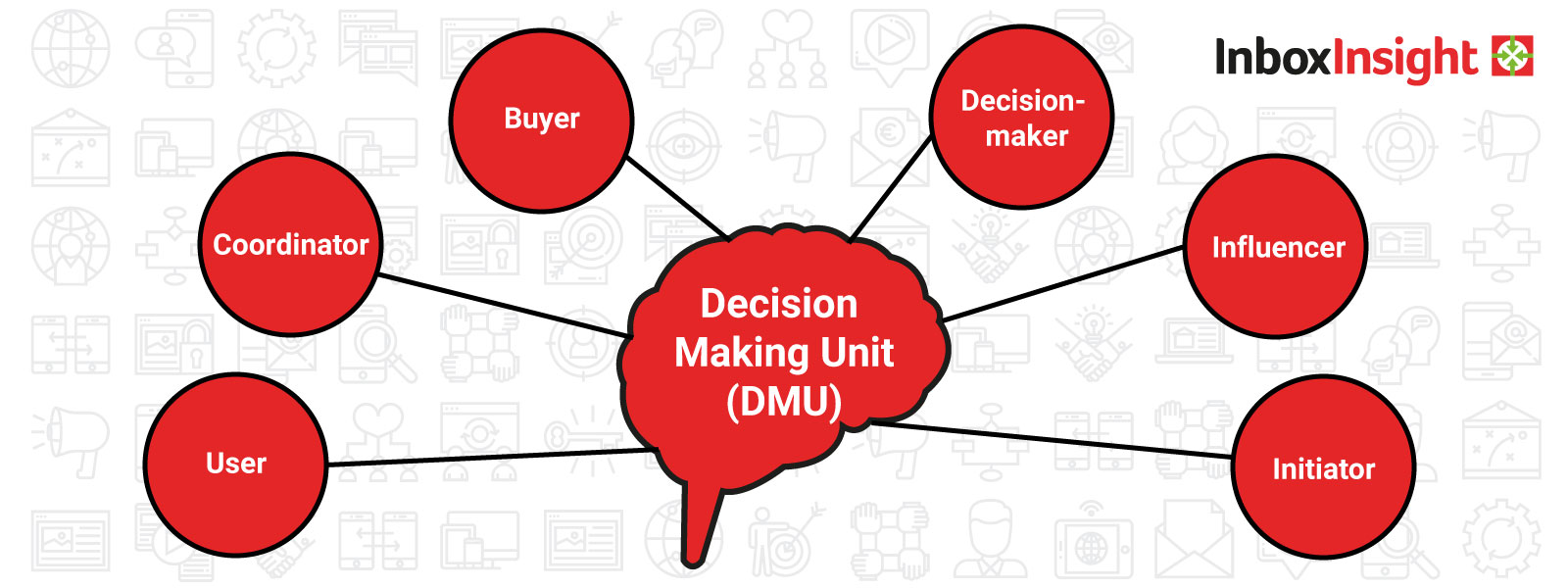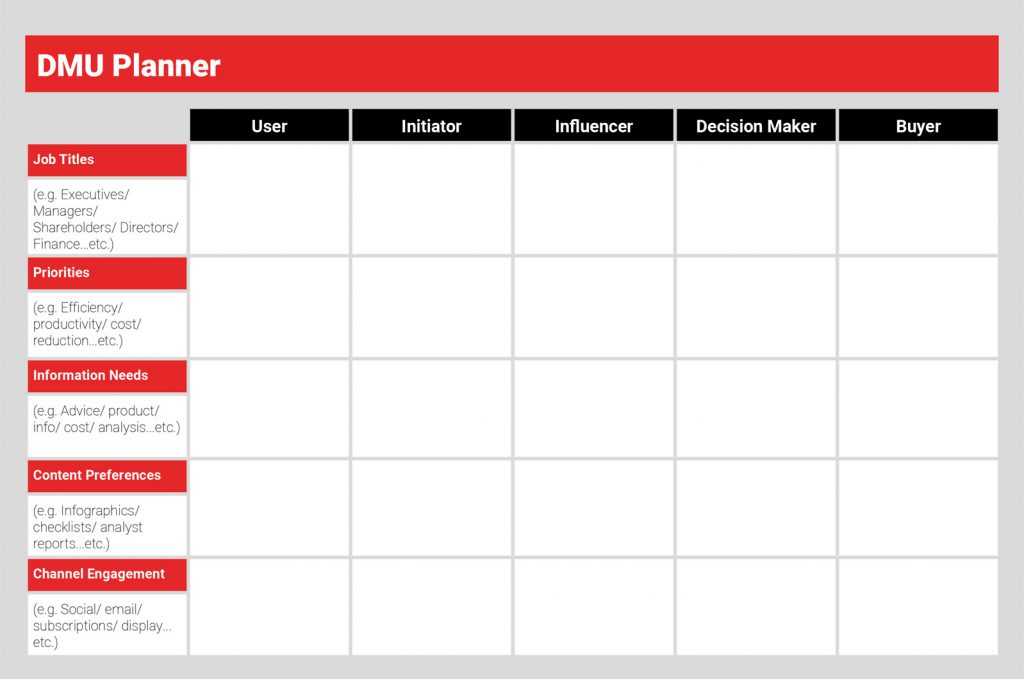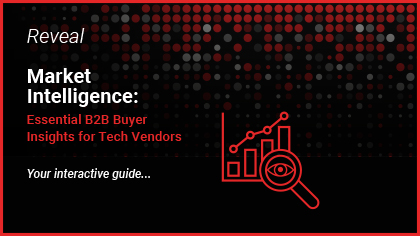What is a Decision-Making Unit (DMU)?
A Decision-Making Unit (DMU) is a group of individuals within an organization who work together to make a purchase decision. This is especially relevant in business-to-business (B2B) transactions, where buying decisions are complex and require the input of multiple stakeholders. Each member of the DMU has a unique role in the decision-making process, and their combined efforts ultimately determine the outcome of the purchasing decision.
Key characteristics of a DMU:
- Multiple stakeholders: DMUs typically comprise individuals from a diverse range of departments – including finance, operations, and management, among others.
- Varied influence levels: Members possess different degrees of sway over the final decision, depending on their position and expertise
- Collective decision-making: The decision-making process is a collaborative effort, often demanding consensus or majority agreement
- Complex dynamics: The interaction within a DMU can be intricate, owing to the diverse priorities and goals of its members.
Importance of the Decision-Making Unit in B2B
For vendors and sales professionals, understanding an organization’s DMU is essential for developing effective sales strategies. By tailoring communications to the specific concerns and interests of each DMU member, you can significantly increase the chances of a successful sale. This understanding also helps identify potential allies or opponents, enabling a more targeted approach.
Reading time: 9 minutes
ABM and DMU integration
As 88% of senior B2B marketers have noted improved conversion rates with ABM, it’s important to consider the connection between ABM and DMU. A common pitfall in adopting an ABM strategy is failing to account for all the members of the DMU in the B2B marketing segmentation strategy. With nearly 70% of businesses involving five or more people in the buying process, and 90% of business professionals acknowledging that at least one DMU member often tries to sway the decision in their favor, it’s clear that focusing solely on the main budget holder or C-suite executive is not enough.
For instance, have you ever seen a promising engagement with a prospect suddenly stall or not advance? This might be due to the influence of another DMU member. If your content doesn’t address the needs and priorities of all key stakeholders, your efforts might be undermined later on. However, by engaging all members of the DMU, your chances of success are considerably higher.
It’s time to recognize and leverage the influence of lower and mid-level stakeholders within your target account’s DMU. These individuals can be more accessible and can significantly influence the success of your campaign.
This article puts the DMU back in the center of your B2B marketing strategy, making sure you deliver what they want to hear, in order to win their trust (and business).

The combined power of individual B2B decision makers
The B2B buying decision is made collectively. But in order to win over the majority of individual stakeholders that make up that buying collective, you’ve got to know what each member wants to hear, and when they want to hear it.
This statement brings forth 2 considerations:
- The individual needs of each stakeholder (81% of B2B buyers now expect a personalized online buying experience)
- The processes they go through when making a decision about you (94% of B2B buyers research online at some point in the buying process)
In order to address the above, it’s important to go back to marketing basics – the Decision Making Unit model (also known as a buying center).
6 types of decision-makers

According to marketing professor and author David Kotler, there are 6 archetypes in the DMU:
- Initiator: The individual who initiates the need or identifies a problem that requires a solution
- Buyer: The person responsible for making the purchase, often handling financial aspects and negotiations
- Decision Maker: The individual with the authority to finalize the decision, giving the green light for the purchase
- Coordinator/Gatekeeper: This role involves managing information flow and controlling access to decision-makers, acting as a gatekeeper to the decision-making process
- Influencer: Those who can impact the decision-makers by providing insights, opinions, or recommendations
- User: The end-users or those who will directly interact with the product or service
| DMU member | Responsibilities | Influence | Example |
| Initiator | Identifies the need or opportunity for a new B2B solution Starts the conversation about a potential purchase May conduct preliminary research on potential solutions | As the one who brings the problem to light, the Initiator can set the direction for the kind of solutions the company will consider Their enthusiasm and urgency for the solution can motivate the rest of the DMU to act quickly | A marketing manager notices that their current CRM system is not scaling with the business growth and initiates the search for a new, more robust solution Influence: They kickstart the buying process and are often the first point of contact for vendors. They can set the tone for what features or capabilities are deemed essential |
| Buyer | Holds the budget and makes the purchase Evaluates the cost-effectiveness and ROI of the proposed solutions Negotiates terms and conditions with vendors | The Buyer has a direct impact on the purchasing decision, often with the final say on whether the budget will be allocated for the purchase They can advocate for a solution that offers the best value for money | The procurement officer receives requirements and budget constraints from various departments and is responsible for negotiating terms with vendors Influence: They control the purse strings and can often negotiate on price and terms, directly affecting the vendor selection based on financial considerations |
| Decision Maker | Has the authority to approve or veto decisions Considers the strategic alignment of the purchase with company goals Weighs the long-term benefits and risks associated with the purchase | Decision Makers have the ultimate authority, and their strategic vision will guide the choice of the solution Their influence is critical as they can bypass or endorse recommendations from other DMU members | The CEO or a department head evaluates the potential impact of the CRM on company-wide operations and makes the final decision on the purchase Influence: As the one who signs off on the purchase, the Decision Maker’s strategic priorities will ultimately drive the choice of solution |
| Coordinator/Gatekeeper | Organizes meetings and information flow among DMU members Controls access to information and individuals within the company Ensures that all necessary procedures and protocols are followed | Gatekeepers can facilitate or hinder the flow of information, thus affecting how quickly and effectively decisions are made They have the power to keep vendors in consideration or remove them from the list | An executive assistant manages the schedules and access to the C-suite, sets up the meetings for product demos, and organizes the follow-up discussions Influence: By controlling the flow of information and access, Gatekeepers can significantly speed up or slow down the decision-making process |
| Influencer | Provides expert opinion on the technical or functional aspects of the purchase Assists in evaluating the merits and drawbacks of each option May influence others through formal reports or informal conversations | Influencers can shape the views of other DMU members through their specialized knowledge Their reputation and expertise can lend credibility to their preferred solutions | The IT director assesses the technical compatibility of the new CRM with the existing IT infrastructure and provides recommendations based on their expertise Influence: As the technical authority, the Influencer’s assessment can be crucial in persuading the rest of the DMU to consider or dismiss certain solutions |
| User | Uses the product or service on a daily basis once purchased Provides feedback on the practicality and effectiveness of the solutions May identify specific features or support requirements | Users have a direct stake in the functionality and usability of the product, so their feedback is highly valuable A strong push from Users for or against a solution can sway the decision, especially if it impacts their efficiency or job satisfaction | Sales representatives who will be using the CRM daily provide feedback on their needs, such as ease of use, mobile access, and integration with email and social media platforms Influence: Users’ direct experience with the product can be a powerful influence, especially when they voice how the solution can impact their day-to-day work and overall productivity |
Each member plays a significant role in the B2B buying decision, regardless of seniority. This doesn’t necessarily mean you must create an individual content marketing strategy for each individual role, it does however show the importance of engaging more than one member.
Dig Deeper: understanding the modern DMU to improve your B2B targeting strategy
The DMU concept was first created by Webster and Wind in 1972. Unsurprisingly, it’s evolving. Here are 3 game changers:
1. Millennials
Millennials have entered the workforce. 73% of 20-35 year olds are now involved in product or service purchase decisions at their companies. 75% of the global workforce is predicted to be made up of millennials by 2025. This new demographic has brought new B2B market research habits. They are digital natives who gravitate more strongly towards video and online, being the digital savvy individuals they are. Oh, and by the way – 75% of millennials feel phone calls are too time-consuming…
2. Online buying
61% of B2B buyers research products from their smartphones, with over half of all web traffic now existing on mobile phones. Meetings and phone calls with sales contacts now take place much later in the buying process. After completing their online research, buyers are choosing who they want to speak to. It’s an ‘invitation only’ sales shortlist. To make it onto the guest list, you must provide relevant information throughout the customer journey. Essentially, around 80% of all internet traffic is triggered by user intent; the need for information.
3. Bigger DMUs
As our earlier stat showed, the DMU is growing – climbing from an average of 5.4 two years ago to 6.8 today. To reach this larger, more diverse group, marketing campaigns have to work harder than ever. This means creating more diverse audience personas and relevant content. One-size-fits-all is unlikely to succeed (Account-Based Marketing Research Report).
How can I map the DMU to better plan my demand generation campaigns?
We’ve created the following template to assist with your digital campaign planning. Through mapping each member of your target audience’s DMU, you can begin building a better B2B content strategy that delivers the right content to the right person in the right way.

What other factors shape the mindset of modern B2B Decision Makers?
The traditional notion of a B2B DMU stakeholder as a rational, calm and calculated buyer immune to emotion is shifting, especially when you consider the impact the talent shortage, social media and a growing millennial workforce have on the importance of cultivating employee wellbeing and company culture. Millennials are replacing retiring baby boomers, bringing different aspirations, beliefs and values to the workplace. 94% of business professionals believe company culture is important to an organization’s success.
In a digital age where we’re encouraged to think and feel, in equal measures, can we afford to neglect the emotional side of a B2B buyer? In fact, in a major study partnered with Google it was revealed on average, B2B customers are significantly more emotionally connected to their vendors and service providers than consumers and are 50% more likely to buy a product or service when they see personal value (Google, CEB Marketing, Motista).
What’s more, further CEB research suggests the phycological impact of living in an abundance of choice and information is taking its toll, leaving many buyers deeply uncertain, stressed and overwhelmed (Harvard Business Review).
With this in mind, here are 10 questions to help tap into the psyche of your B2B buyers:
- Who are they trying to impress? (Other members in the DMU, peers, family…etc.)
- What struggles are they going through? (Professional/personal…etc.)
- How can your content make their jobs easier? (Gain back time, increase productivity…etc.)
- What trends or topics do they follow? (Intent data, subsciptions…etc)
- What content are they likely to share in their LinkedIn feed? (Curated content, their own thought leadership, news alerts…etc)
- What knowledge will make them look good in front of peers and other stakeholders? (Thought leadership, strategic input, trend forecasting…etc.)
- Who do they trust? (Thought leaders, peer groups…etc.)
- Who do they aspire to become? (CEO, Director, Thought Leader…etc)
- Which Tone of Voice (ToV) resonates best? (Specialist terminology vs accessible language, warm vs authoritative tone…etc)
- How can you simplify their decision making process? (Prescriptive approach, nurture process…etc.)
The bottom line
The more you uncover what makes your target audience tick, the more accurately you can plan your communications to deliver the best content experiences that result in a purchase. This includes factoring in all the key stakeholders, after all, many individuals lead to one powerful and coercive buying collective.
Was this article helpful?
For more expert tips and actionable advice, download our definitive guide ‘The Holy Grail of B2B Marketing Segmentation‘








